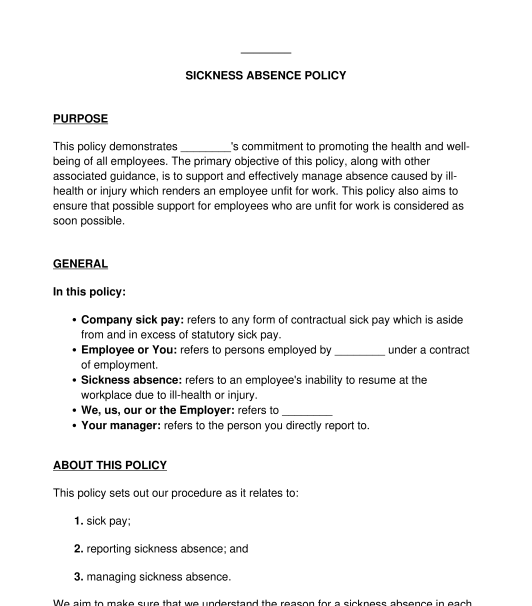 01/11/2025
01/11/2025

Answer a few questions and your document is created automatically.

Your document is ready! You will receive it in Word and PDF formats. You will be able to modify it.

 01/11/2025
01/11/2025
 Word and PDF
Word and PDF
 5 to 8 pages
5 to 8 pages
An employer's sickness policy is a document that contains and outlines how an employer will handle employees' absense from work that arises because of sickness. This includes how the employer will handle sick pay (i.e. remuneration to the employee even when the employee is absent from work), how an employee is to inform the employer of their incapacity to work due to sickness, and how longer-term absences will be treated by the employee.
For example, where an employee falls ill and cannot come to work, they will have to inform their employer using the steps outlined in the sickness policy as failure to do so could affect their entitlement to sick pay or count as unauthorised absence from work.
No, it is not mandatory for an employer to have a sickness policy. This is because the employer can include the aspects of its sickness policy within the employment contract. However, it may be useful for the employer to have a sickness absence policy. This is because it could be easier for the employee to refer to a separate document dedicated to sickness absence to understand the employer's policy. Additionally, a stand alone sickness policy can be more comprehensive and have more detail surrounding the issue of employee sickness absence.
A sickness policy covers all employees hired by the employer. The employee must have an employment contract and have already begun work under that employment contract.
The employer can be any form of business structure, such as a sole trader, a general partnership, an LLP or a company.
A sickness policy does not cover independent contractors who work in or with the employer. This means persons contracted under a consultancy agreement, freelancer agreement or a service contract.
A sickness policy can be valid for the duration of the employee's employment. However, the employer can always amend the policy at any time. When the employee's employment contract comes to an end or is terminated, the sickness policy will no longer apply to them.
Once the policy has been created, it should be signed by the person within the employer's organisation who has authority to do so. This can be the HR Manager or Welfare Officer.
The policy can then be printed out and given to the employees, or sent to them via email. The policy can also be published on the employer's intranet, where it is easily accessible by the employees.
No, it is not necessary to have witnesses for an employer's sickness policy. This is because the policy only needs to be signed by the employer or their representative, and the employee is not a party to the policy, as it is not an agreement. The contents of the policy are unilaterally decided by the employer and are not subject to the employee's agreement.
An employer's sickness policy must contain:
Access to Medical Reports Act 1988
Social Security Contributions and Benefits Act 1992
You fill out a form. The document is created before your eyes as you respond to the questions.
At the end, you receive it in Word and PDF formats. You can modify it and reuse it.
Guides to help you
Employer's Sickness Policy - Template - Word & PDF
Country: United Kingdom